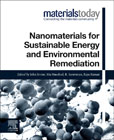
Nanomaterials for Sustainable Energy and Environmental Remediation
Irvine, John
Naushad, Mu.
Saravanan, R.
Kumar, Raju
Nanostructured materials, especially, 1D, 2D and 3D nanostructures, and their engineered architectures are being increasingly used due to their potential to achieve sustainable development in energy and environmental sectors, providing a solution to a range of global challenges. A huge amount of research has been devoted in the recent past on the fine-tuning of nano-architecutres to accomplish innovations in energy storage and conversions, i.e., batteries, supercapacitors, fuel cells, solar cells, and electrochromic devices, bifunctional catalysts for ORR and OER, gas to fuels, liquid to fuels, and photocatalysts, corrosion, electrochemical sensors, and pollution and contaminants removal. Nanomaterials for Sustainable Energy and Environmental Remediation describes the fundamental aspects of a diverse range of nanomaterials for the sustainable development in energy and environmental remediation in a comprehensive manner. Experimental studies of varies nanomaterials will be discussed along with their design and applications, with specific attention to various chemical reactions involving and their challenges for catalysis, energy storage and conversion systems, and removal of pollutants are addressed. This book will also emphasise the challenges with past developments and direction for further research, details pertaining to the current ground - breaking technology and future perspective with multidisciplinary approach on energy, nanobiotechnology and environmental science Summarizes the latest advances in how nanotechnology is being used in energy and environmental scienceOutlines the major challenges to using nanomaterials for creating new products and devices in the sustainable energy and environmental sectorsHelps materials scientists and engineers make selection and design decisions regarding which nanomaterial to use when creating new produts and evices for energy and environmental applications INDICE: 1. Nanostructured materials for sustainable development in lithium-ion and post-lithium-ion batteries2. Nanomaterials for advanced supercapacitors3. Engineered nanoarchitectures for high performance solar cells4. Nanomaterials for gas to fuel conversion, storage and utilization5. Bi-functional nanocatalysts for water splitting and its challenges6. Nanostructured advanced materials for hydrogen storage7. Advanced nanocatalysts for fuel cell technologies8. Nanoscale materials with different dimensions for advanced electrocatalysts9. Nanomaterials in electrochemical and biosensors10. Emerging nanoarchitectures for excellent photocatalysis11. Nanomaterials for surface coatings, corrosions and paints12. Nanomaterials for the detection and removal of gases13. Nanoscale materials for the treatment of water contaminated by bacteria and viruses14. Nanostructured materials for efficient removal of pollutants in soil15. Summary and future perspectives of materials and technologies
- ISBN: 978-0-12-819355-6
- Editorial: Elsevier
- Encuadernacion: Rústica
- Páginas: 500
- Fecha Publicación: 01/03/2020
- Nº Volúmenes: 1
- Idioma: Inglés
